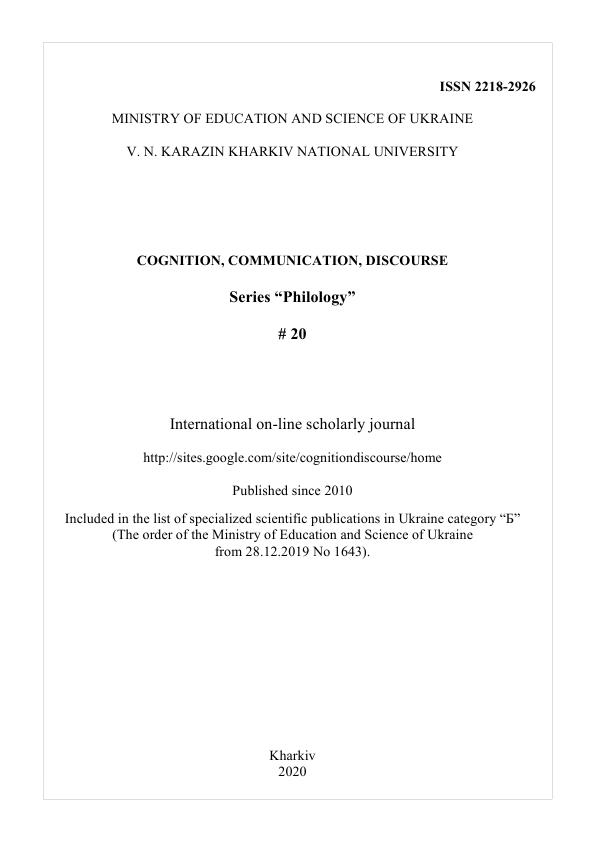In search of identity: trauma and irony in the cognitive light
Abstract
For many decades Scottish Literature has produced characters that fitted well within the atmosphere of despair and inferiority undergone by the Scottish nation in the course of its history. The question of identity being at its heart, Scottish Literature has revealed a specific feature consisting in the frequent occurrence of traumatized, dual and split personalities. These are protagonists who in the force of Scotland’s history are traumatized and symbolize Scotland’s remarkable tradition of despair and the feeling of inferiority and powerlessness. However, a closer look at the contemporary Scottish female writing permits to take a new angle for exploring identity. Our approach accounts for the role of irony and humor that the characters provide. The fact of incongruity / trauma vs. irony/ creates a basis for insightful explorations of the dual essence of identity in A.L. Kennedy’s and J. Galloway’s writing in the light of such counter-concepts as emotional fulfillment vs. isolation, feminist vs. domestic expectations. Thus, our research within the frames of “Caledonian polysyzygy” aims at showcasing how and in what ways the cognitive study of the ironic component can contribute to the revelation of different aspects of identity crisis and survival. The features of the expression of irony are brought out with the help of cognitive metaphor, hyperbole, comparison, etc. It is argued that irony is based on the author's vision of the world and is characterized by the presence of explicit and hidden meanings which accounts for the clash between the vision and the reality. It is established that irony, a crucial aspect in the works of the mentioned authors, is a multi-layered cognitive and discursive phenomenon that aims to highlight the collision between thinking and reality.
Downloads
References
Dunningan, M. S. (2000). A.L. Kennedy’s Longer Fiction: Articulate Grace. In A. Christianson, & A. Lumsden (Eds.). Contemporary Scottish Women Writers (pp. 144-156). Edinburgh: Edinburgh University Press,
Gasparyan, S. К. (2008). Lingvopoetika obraznogo sravnenija. [The Linguopoetics of Figurative Simile]. Yerevan: Lusakn Publishing House (in Russian).
Gasparyan, S. K., Sargsyan, M. S., & Madoyan G. G. (2017). Syntactic and Rhythmic Properties of Representing the Concept of “Loneliness” in K. Mansfield’s Short Stories. Cognition, Communication, Discourse. 14. 45-53. doi: 10.26565/2218-2926-2017-14-04
Gifford, D. (1988). Myth, parody and dissociation: Scottish Fiction 1814–1914. In D. Gifford (Ed.) The History of Scottish Literature (Vol. 3). Aberdeen: Aberdeen University Press.
Kravitz, P. (1998). As It Never Was. Introduction. In P. Kravitz (Ed.). The Picador Book of Contemporary Scottish Fiction. London: Picador.
Kelly, S. (2009). Introduction. In Kelly Stuart (Ed.). Headshook: Contemporary Novelists and Poets Writing on Scotland’s Future. London: Hachette Scotland.
Kotjurova, I. A. (2007). Kognitivnyj analiz realizacii ironii v publicistike (na materiale nemeckih statej politicheskoj tematiki) [Cognitive aspect of irony’s realization in journalism (on the material of German press article on politics)]. Vestnik Sankt-Peterburgskogo universiteta. 9(2). 170-175 (In Russian)
Lakoff, G., & Johnson, M. (1980). Metaphors We Live by. Chicago, London: University of Chicago Press.
Lakoff , G., Turner, M. (1989) More than Cool Reason: A Field Guide to Poetic Metaphor. Chicago-London: University of Chicago Press.
March, L. C. (2002). Rewriting Scotland. Welsh, McLean, Warner, Banks, Galloway, and Kennedy. Manchester and New York: Manchester University Press.
Smith, G. G. (1919). Scottish Literature, Character and Influence. London: Macmillan Publishing.
Oxford Living Dictionaries (OLD). English. https://en.oxforddictionaries.com/ (Accessed 29 October 2018 )
Potyomina, S. M. (2010). Polifunkcional'nost' ironii. [Polyfunctionality of Irony]. Bulletin of I. Kant Russian State University. Philological Sciences, 8. 134-137 (in Russian)
Routledge Dictionary of Literary Terms (RDLT). https://www.uv.es/fores/The_Routledge_Dictionary_of_Literary_Terms.pdf (Accessed 10 October 2018)
Wallace, G. (1993). Voices in Empty Houses: The Novel of Damaged Identity. In G. Wallace, & R. Stevenson (Eds.). The Scottish Novel since the Seventies (pp. 217-218). Edinburgh: Edinburgh University Press.
Copyright (c) 2020 Seda K. Gasparyan, Sargsyan Mariana S.

This work is licensed under a Creative Commons Attribution-NonCommercial-NoDerivatives 4.0 International License.
Authors, who publish with this journal, accept the following conditions:
The authors reserve the copyright of their work and transfer to the journal the right of the first publication of this work under the terms of the Creative Commons Attribution License (CC BY), which allows other persons to freely distribute a published work with mandatory reference to the authors of the original work and the first publication of the work in this journal.
Authors have the right to enter into separate additional agreements for the non-exclusive dissemination of the work in the form in which it was published by this journal (for example, to post the work in the electronic institutions' repository or to publish as part of a monograph), provided that the link to the first publication of the work in this journal is given.
The journal policy allows and encourages the authors to place the manuscripts on the Internet (for example, in the institutions' repositories or on personal websites), both before the presentation of this manuscript to the editorial board and during review procedure, as it contributes to the creation of productive scientific discussion and positively affects the efficiency and dynamics of citing the published work (see The Effect of Open Access).




